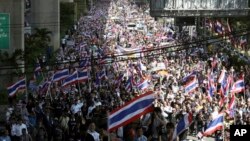BANGKOK —
Thousands of protesters took to the streets of the Thai capital on Monday after lawmakers approved a draft political amnesty bill late Friday night that could allow the return of self-exiled former premier Thaksin Shinawatra, one of Thailand's most polarizing figures.
The bill's opponents say it's a thinly veiled attempt by the ruling Pheu Thai Party and its leader, Prime Minister Yingluck Shinawatra, Thaksin’s younger sister, to whitewash the crimes of her billionaire brother. Thaksin was overthrown in a military coup in 2006 and has lived abroad since 2008 to escape corruption charges.
Protesters expressed frustration with Yingluck's government.
“There are [so] many issues [resulting from this government] that I can't stand it anymore. The things about corruption and amending the constitution. I just want our constitution sacred and just. The law should be powerful enough to enforce on everyone, not just some,” said an unidentified protester.
“When you look at the number of people here who are against the amnesty law, the government should be convinced to pull out the proposed law. The government has the majority [of] seats in Parliament [so is able] to solve this. The senators in the upper house are another branch who can stop this. They should come out to show their views and to vote against the law when it's read in the upper house,” said Nipit Intharasombat, a member of the Democrat Party.
Although it could be months before the bill becomes law, the protests in Bangkok by Thaksin's opponents, including royalist groups and members of the opposition Democrat Party, threaten to disturb months of relative calm in a country scarred by bloody unrest in 2010.
Thaksin, who won elections in 2001 and 2005 by landslides, remains a populist hero among the poor, whose votes helped Yingluck and her party sweep elections in 2011.
However, corruption scandals and alleged abuses of power steadily eroded his popularity among Bangkok's middle classes. That was compounded by royalist accusations that Thaksin was undermining the country's powerful monarchy, which he denied.
Since fleeing, Thaksin has hovered ghost-like over Thai politics, setting the broad policy lines for the government.
The bill's opponents say it's a thinly veiled attempt by the ruling Pheu Thai Party and its leader, Prime Minister Yingluck Shinawatra, Thaksin’s younger sister, to whitewash the crimes of her billionaire brother. Thaksin was overthrown in a military coup in 2006 and has lived abroad since 2008 to escape corruption charges.
Protesters expressed frustration with Yingluck's government.
“There are [so] many issues [resulting from this government] that I can't stand it anymore. The things about corruption and amending the constitution. I just want our constitution sacred and just. The law should be powerful enough to enforce on everyone, not just some,” said an unidentified protester.
“When you look at the number of people here who are against the amnesty law, the government should be convinced to pull out the proposed law. The government has the majority [of] seats in Parliament [so is able] to solve this. The senators in the upper house are another branch who can stop this. They should come out to show their views and to vote against the law when it's read in the upper house,” said Nipit Intharasombat, a member of the Democrat Party.
Although it could be months before the bill becomes law, the protests in Bangkok by Thaksin's opponents, including royalist groups and members of the opposition Democrat Party, threaten to disturb months of relative calm in a country scarred by bloody unrest in 2010.
Thaksin, who won elections in 2001 and 2005 by landslides, remains a populist hero among the poor, whose votes helped Yingluck and her party sweep elections in 2011.
However, corruption scandals and alleged abuses of power steadily eroded his popularity among Bangkok's middle classes. That was compounded by royalist accusations that Thaksin was undermining the country's powerful monarchy, which he denied.
Since fleeing, Thaksin has hovered ghost-like over Thai politics, setting the broad policy lines for the government.





